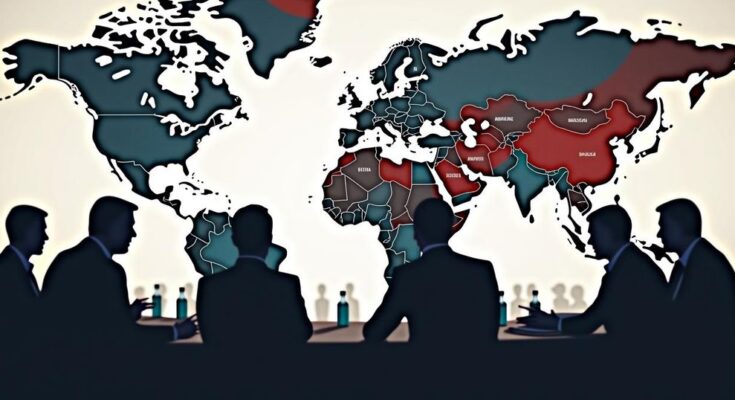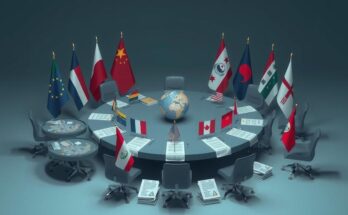Israeli Prime Minister Benjamin Netanyahu, at the UN General Assembly, showcased two maps that depicted regional dynamics, with no mention of Palestine. He attributed ongoing conflicts to Iranian influence and asserted Israel’s defensive posture against Iranian-backed groups. The maps included nations like Saudi Arabia, Egypt, Sudan, and India, indicating a focus on potential alliances while neglecting Palestinian statehood.
During a recent address at the United Nations General Assembly, Israeli Prime Minister Benjamin Netanyahu presented two maps, symbolically labeled “The Curse” and “The Blessing”. In these visual representations, he portrayed nations associated with instability and conflict in black, while depicting those with whom Israel has established, or is seeking to establish, relations in green. Notably absent from both maps was any recognition of Palestine, reflecting an ongoing narrative that disregards its existence. Netanyahu asserted a direct connection between the black map and Iranian influence, stating that Iran, alongside its allies, is a primary contributor to unrest in the region. He attributed the violent situations in Lebanon, Syria, and Yemen to Tehran’s military and financial support for groups like Hezbollah and Hamas, positioning Israel as a nation that is merely responding defensively to external aggression. As he spoke, numerous diplomats exited the venue in protest. Netanyahu’s remarks also emphasized Israel’s military operations as justified reactions to threats posed by Iranian-backed groups, with a clear warning directed at Iran: “If you strike us, we will strike you.” Amid discussions of normalization of relations, notable countries on the green map included Saudi Arabia, Egypt, Sudan, and India. While Saudi Arabia’s potential ties to Israel face hurdles tied to Palestinian statehood aspirations, Egypt has sustained a formal yet cautious relationship with Israel. Sudan’s recent diplomatic shift towards Israel and India’s growing ties marks a significant evolution in Middle Eastern dynamics and international relations.
Benjamin Netanyahu’s presentation at the UN General Assembly underscores a broader geopolitical narrative concerning Israel’s position in the Middle East. By categorizing nations based on perceived alliances and adversities, Netanyahu aims to highlight the complexities of regional politics, particularly focusing on the role of Iranian influence in exacerbating conflicts. This approach reflects both a strategy to consolidate support among allied nations and a means to frame Israel’s military actions as direct consequences of Iranian aggression. The absence of Palestine from the maps serves to illustrate a viewpoint that aligns with the Israeli government’s stance on territorial and political claims in the region.
Netanyahu’s address at the United Nations not only articulated Israel’s stance regarding Iranian influence and military activities but also presented a vision of regional cooperation with certain Arab nations. By omitting any reference to Palestine, he reinforced a narrative that prioritizes alliances with countries willing to engage with Israel. This presentation raises critical questions about the future of Israeli-Palestinian relations and the potential pathways towards peace given the current geopolitical climate.
Original Source: www.ndtv.com




